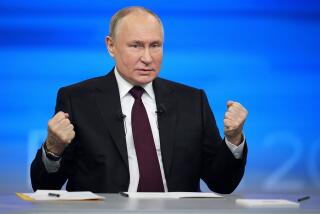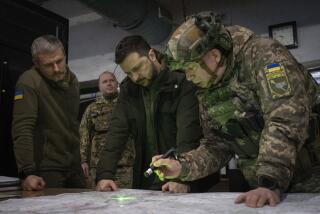Yeltsin Admits Worry Over His Unpopularity
- Share via
MOSCOW — Boris N. Yeltsin, in a rare concession Monday, acknowledged that a majority of Russians are openly dissatisfied with him as president and said it gives him cause to worry.
Emerging from months of seclusion because of prolonged ill health, Yeltsin criticized his own administration for its inability to pay wages and pensions for months at a time, leaving millions of people destitute and bringing some government operations to a standstill.
“Many Russians are unhappy with the government, and consequently they’re unhappy with the president,” Yeltsin said. “People are openly speaking of that, and the dissatisfied already constitute the majority. I am worried.”
The nonpayment of wages has reached a crisis throughout the country, and daily protests take many forms: demonstrations, labor strikes, hunger strikes and even suicide.
In many regions outside Moscow, power and fuel are in short supply, soldiers don’t have enough to eat, teachers faint from hunger in the classroom and scientists warn of nuclear disaster if needed funds are not delivered.
Some factory workers get their wages in the form of unwanted products, such as the laborers at the Akhtuba factory in Volgograd who once made high-precision navigational instruments for the military. Unpaid for 13 months, they now are paid in unsold rubber sex toys instead of rubles.
“People are suffering, and we cannot permit that,” Yeltsin told Prime Minister Viktor S. Chernomyrdin in a televised meeting. “You and I are responsible for this matter. I take an equal share of responsibility, for I am the president and certainly I’m responsible for the work of the government.”
The president cited a poll showing that more than 50% of Russians are dissatisfied with him. “The main thing, of course, is that the government has been unable to cope with the problem of pensions, wages and other payments,” he said.
The session seemed designed to show that Yeltsin, who Sunday declared himself “fully recovered” from his heart bypass operation and a subsequent bout with pneumonia, is back in charge at the Kremlin after being absent for most of the past eight months.
Yeltsin publicly scolded his prime minister for the government’s problems and directed him to come up with names of top officials who should be fired. “Maybe some of those who do not do their duties in this government should be replaced,” Yeltsin declared.
He made similar pronouncements and issued decrees ordering the payment of back salaries and pensions last year when he was running for reelection and again in the months following his July victory. But because of inefficiency, corruption and public antipathy toward taxes, the government has not been able to collect enough money to keep itself running, satisfy its debts and pay people’s wages and pensions.
During the past week, more than 250,000 teachers in more than 6,000 schools were on strike to protest their lack of pay. “There are cases when teachers faint during lessons because of hunger,” said Galina Terebilova, a striking teacher from the northern city of Kirovsk. “This is not an exaggeration.”
Meanwhile, the wives of 26 workers who helped clean up after the Chernobyl nuclear disaster were in the eighth day of a hunger strike Monday, seeking overdue benefit payments.
And workers at the huge Chelyabinsk tractor factory in the Ural mountains staged a one-day strike Monday to protest the nonpayment of their wages--which in some cases amount to less than $10 a month.
A poll released Monday by the Independent Public Opinion Fund reported that 36% of Russians surveyed believe that this nation’s economy has hit bottom, while 49% believe that the economy will get worse. Only 6% said they believe Russia’s economy is better now than in the past.
In many parts of Russia, a system of barter has emerged as workers try to trade their share of factory products for items they need.
*
At the Akhtuba factory, military hardware has been replaced by a variety of goods no one can sell, including car jacks and pedal-powered lawn sprinklers.
Tamara Lozhintseva, head of the factory labor union, told the Moscow Times that the plant is facing such difficulty because the Defense Ministry owes it $3.5 million--a sum that was supposed to be paid by May of last year under a preelection decree issued by Yeltsin. “We are on the verge of a strike to end this insulting situation,” Lozhintseva said.
More to Read
Sign up for Essential California
The most important California stories and recommendations in your inbox every morning.
You may occasionally receive promotional content from the Los Angeles Times.










